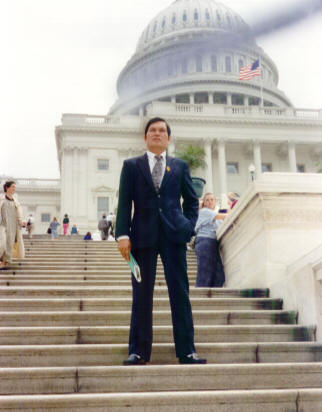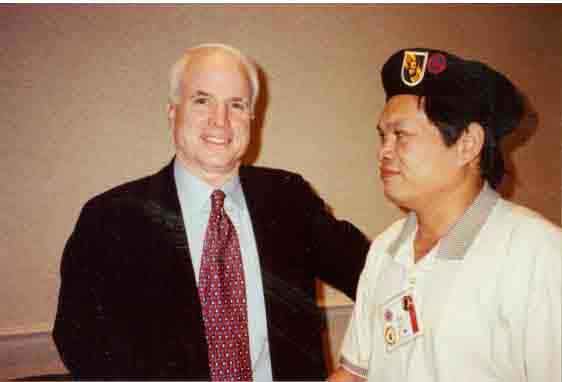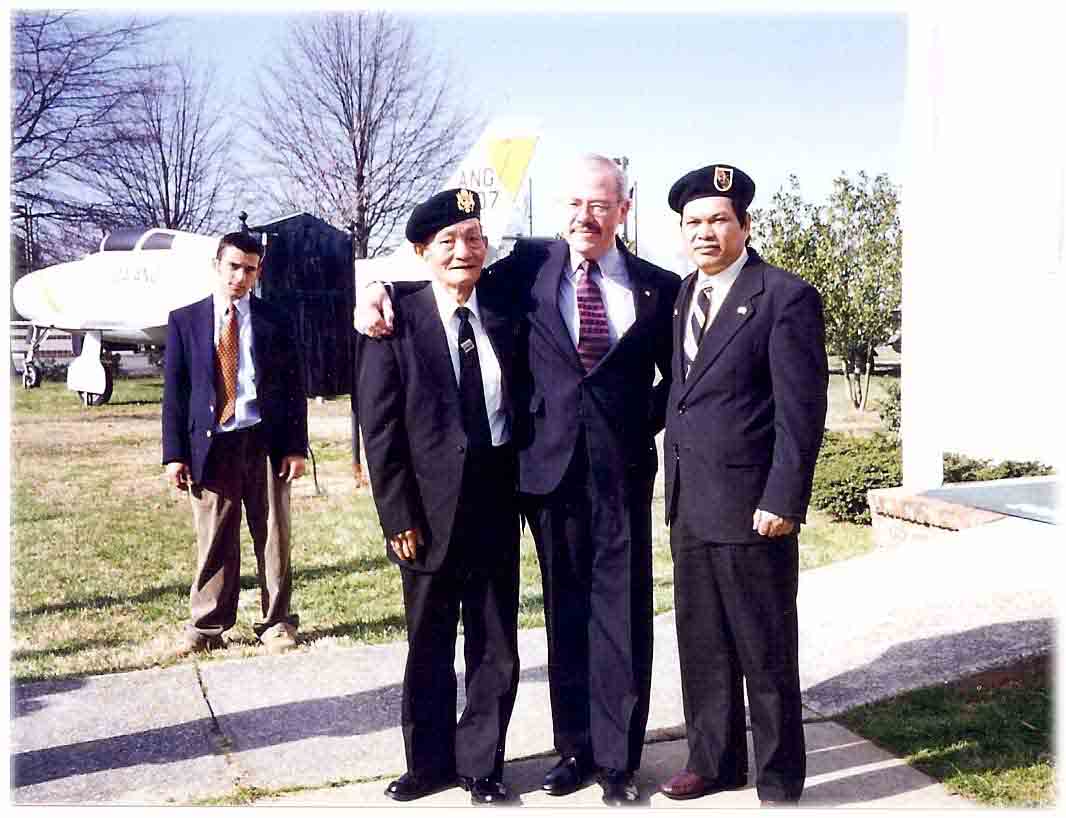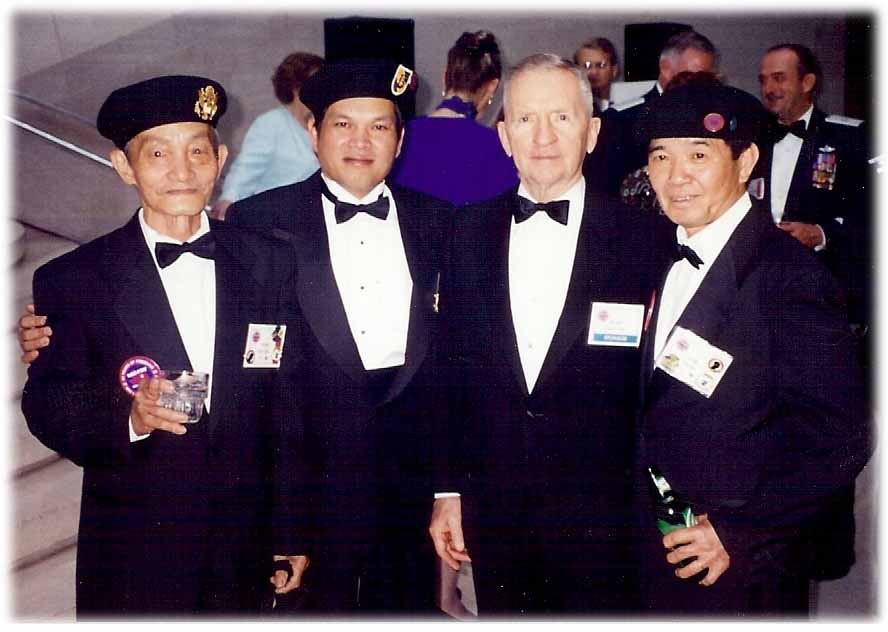Douglas MacArthur -
"Duty, Honor, Country"
delivered 12 May 1962 West Point, NY
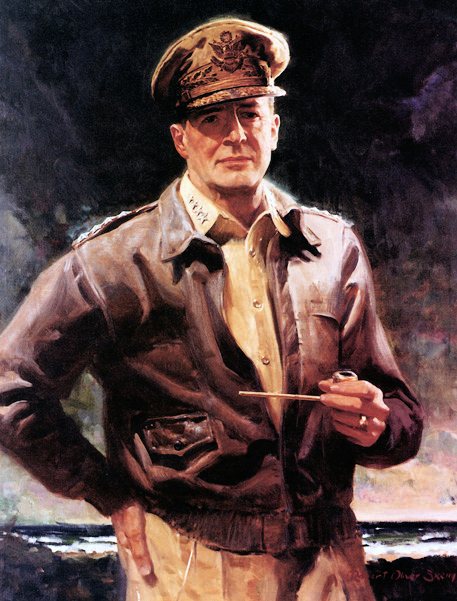
Original Painting ©Copyright
(image used with permission)
delivered 12 May 1962,
[AUTHENTICITY CERTIFIED: Text version below transcribed directly from audio.]
General Westmoreland, General Grove, distinguished guests, and gentlemen of the Corps!
"Duty, Honor, Country"
Sylvanus Thayer Award Acceptance Address
As I was leaving the hotel this morning, a doorman asked me, "Where are you bound for, General?" And when I replied, "West Point," he remarked, "Beautiful place. Have you ever been there before?"
No human being could fail to be deeply moved by such a tribute as this [Thayer Award]. Coming from a profession I have served so long, and a people I have loved so well, it fills me with an emotion I cannot express. But this award is not intended primarily to honor a personality, but to symbolize a great moral code -- the code of conduct and chivalry of those who guard this beloved land of culture and ancient descent. That is the animation of this medallion. For all eyes and for all time, it is an expression of the ethics of the American soldier. That I should be integrated in this way with so noble an ideal arouses a sense of pride and yet of humility which will be with me always
Duty, Honor, Country: Those three hallowed words reverently dictate what you ought to be, what you can be, what you will be. They are your rallying points: to build courage when courage seems to fail; to regain faith when there seems to be little cause for faith; to create hope when hope becomes forlorn.
Unhappily, I possess neither that eloquence of diction, that poetry of imagination, nor that brilliance of metaphor to tell you all that they mean.
The unbelievers will say they are but words, but a slogan, but a flamboyant phrase. Every pedant, every demagogue, every cynic, every hypocrite, every troublemaker, and I am sorry to say, some others of an entirely different character, will try to downgrade them even to the extent of mockery and ridicule.
But these are some of the things they do: They build your basic character. They mold you for your future roles as the custodians of the nation's defense. They make you strong enough to know when you are weak, and brave enough to face yourself when you are afraid. They teach you to be proud and unbending in honest failure, but humble and gentle in success; not to substitute words for actions, not to seek the path of comfort, but to face the stress and spur of difficulty and challenge; to learn to stand up in the storm but to have compassion on those who fall; to master yourself before you seek to master others; to have a heart that is clean, a goal that is high; to learn to laugh, yet never forget how to weep; to reach into the future yet never neglect the past; to be serious yet never to take yourself too seriously; to be modest so that you will remember the simplicity of true greatness, the open mind of true wisdom, the meekness of true strength. They give you a temper of the will, a quality of the imagination, a vigor of the emotions, a freshness of the deep springs of life, a temperamental predominance of courage over timidity, of an appetite for adventure over love of ease. They create in your heart the sense of wonder, the unfailing hope of what next, and the joy and inspiration of life. They teach you in this way to be an officer and a gentleman.
And what sort of soldiers are those you are to lead? Are they reliable? Are they brave? Are they capable of victory? Their story is known to all of you. It is the story of the American man-at-arms. My estimate of him was formed on the battlefield many, many years ago, and has never changed. I regarded him then as I regard him now -- as one of the world's noblest figures, not only as one of the finest military characters, but also as one of the most stainless. His name and fame are the birthright of every American citizen. In his youth and strength, his love and loyalty, he gave all that mortality can give.
He needs no eulogy from me or from any other man. He has written his own history and written it in red on his enemy's breast. But when I think of his patience under adversity, of his courage under fire, and of his modesty in victory, I am filled with an emotion of admiration I cannot put into words. He belongs to history as furnishing one of the greatest examples of successful patriotism. He belongs to posterity as the instructor of future generations in the principles of liberty and freedom. He belongs to the present, to us, by his virtues and by his achievements. In 20 campaigns, on a hundred battlefields, around a thousand campfires, I have witnessed that enduring fortitude, that patriotic self-abnegation, and that invincible determination which have carved his statue in the hearts of his people. From one end of the world to the other he has drained deep the chalice of courage.
As I listened to those songs [of the glee club], in memory's eye I could see those staggering columns of the First World War, bending under soggy packs, on many a weary march from dripping dusk to drizzling dawn, slogging ankle-deep through the mire of shell-shocked roads, to form grimly for the attack, blue-lipped, covered with sludge and mud, chilled by the wind and rain, driving home to their objective, and for many, to the judgment seat of God.
I do not know the dignity of their birth, but I do know the glory of their death. They died unquestioning, uncomplaining, with faith in their hearts, and on their lips the hope that we would go on to victory. Always, for them: Duty, Honor, Country; always their blood and sweat and tears, as we sought the way and the light and the truth.
And 20 years after, on the other side of the globe, again the filth of murky foxholes, the stench of ghostly trenches, the slime of dripping dugouts; those boiling suns of relentless heat, those torrential rains of devastating storms; the loneliness and utter desolation of jungle trails; the bitterness of long separation from those they loved and cherished; the deadly pestilence of tropical disease; the horror of stricken areas of war; their resolute and determined defense, their swift and sure attack, their indomitable purpose, their complete and decisive victory -- always victory. Always through the bloody haze of their last reverberating shot, the vision of gaunt, ghastly men reverently following your password of: Duty, Honor, Country.
The code which those words perpetuate embraces the highest moral laws and will stand the test of any ethics or philosophies ever promulgated for the uplift of mankind. Its requirements are for the things that are right, and its restraints are from the things that are wrong.
The soldier, above all other men, is required to practice the greatest act of religious training -- sacrifice.
In battle and in the face of danger and death, he discloses those divine attributes which his Maker gave when he created man in his own image. No physical courage and no brute instinct can take the place of the Divine help which alone can sustain him.
However horrible the incidents of war may be, the soldier who is called upon to offer and to give his life for his country is the noblest development of mankind.
You now face a new world -- a world of change. The thrust into outer space of the satellite, spheres, and missiles mark the beginning of another epoch in the long story of mankind. In the five or more billions of years the scientists tell us it has taken to form the earth, in the three or more billion years of development of the human race, there has never been a more abrupt or staggering evolution. We deal now not with things of this world alone, but with the illimitable distances and as yet unfathomed mysteries of the universe. We are reaching out for a new and boundless frontier.
We speak in strange terms: of harnessing the cosmic energy; of making winds and tides work for us; of creating unheard synthetic materials to supplement or even replace our old standard basics; to purify sea water for our drink; of mining ocean floors for new fields of wealth and food; of disease preventatives to expand life into the hundreds of years; of controlling the weather for a more equitable distribution of heat and cold, of rain and shine; of space ships to the moon; of the primary target in war, no longer limited to the armed forces of an enemy, but instead to include his civil populations; of ultimate conflict between a united human race and the sinister forces of some other planetary galaxy; of such dreams and fantasies as to make life the most exciting of all time.
And through all this welter of change and development, your mission remains fixed, determined, inviolable: it is to win our wars.
Everything else in your professional career is but corollary to this vital dedication. All other public purposes, all other public projects, all other public needs, great or small, will find others for their accomplishment. But you are the ones who are trained to fight. Yours is the profession of arms, the will to win, the sure knowledge that in war there is no substitute for victory; that if you lose, the nation will be destroyed; that the very obsession of your public service must be: Duty, Honor, Country.
Others will debate the controversial issues, national and international, which divide men's minds; but serene, calm, aloof, you stand as the Nation's war-guardian, as its lifeguard from the raging tides of international conflict, as its gladiator in the arena of battle. For a century and a half you have defended, guarded, and protected its hallowed traditions of liberty and freedom, of right and justice.
Let civilian voices argue the merits or demerits of our processes of government; whether our strength is being sapped by deficit financing, indulged in too long, by federal paternalism grown too mighty, by power groups grown too arrogant, by politics grown too corrupt, by crime grown too rampant, by morals grown too low, by taxes grown too high, by extremists grown too violent; whether our personal liberties are as thorough and complete as they should be. These great national problems are not for your professional participation or military solution. Your guidepost stands out like a ten-fold beacon in the night: Duty, Honor, Country.
You are the leaven which binds together the entire fabric of our national system of defense. From your ranks come the great captains who hold the nation's destiny in their hands the moment the war tocsin sounds. The Long Gray Line has never failed us. Were you to do so, a million ghosts in olive drab, in brown khaki, in blue and gray, would rise from their white crosses thundering those magic words: Duty, Honor, Country.
This does not mean that you are war mongers.
On the contrary, the soldier, above all other people, prays for peace, for he must suffer and bear the deepest wounds and scars of war.
But always in our ears ring the ominous words of Plato, that wisest of all philosophers: "Only the dead have seen the end of war."1
The shadows are lengthening for me. The twilight is here. My days of old have vanished, tone and tint. They have gone glimmering through the dreams of things that were. Their memory is one of wondrous beauty, watered by tears, and coaxed and caressed by the smiles of yesterday. I listen vainly, but with thirsty ears, for the witching melody of faint bugles blowing reveille, of far drums beating the long roll. In my dreams I hear again the crash of guns, the rattle of musketry, the strange, mournful mutter of the battlefield.
But in the evening of my memory, always I come back to West Point.
Always there echoes and re-echoes: Duty, Honor, Country.
Today marks my final roll call with you, but I want you to know that when I cross the river my last conscious thoughts will be of The Corps, and The Corps, and The Corps.
I bid you farewell.
THE END
Duty, Honor, Country
General MacArthur’s Farewell Speech — Duty, Honor, Country (May 12, 1962)
The address by General of the Army Douglas MacArthur to the cadets of the U.S. Military Academy in accepting the Sylvanus Thayer Award on 12 May 1962 is a memorable tribute to the ideals that inspired that great American soldier. For as long as other Americans serve their country as courageously and honorably as he did, General MacArthur’s words will live on.
General MacArthur’s service to his country spanned the years from 1903, when he was graduated from the Military Academy, to 5 April 1964, when he died in Washington, D.C., at the age of 84. He was recognized early in his career as a brilliant officer and was advanced to brigadier general in 1918. Twelve years later he was named Chief of Staff of the Army, and in 1937 he retired. Recalled to active duty during World War II, he was commander of the Southwest Pacific Area during the greater part of the war. His wartime triumphs were followed by service as supreme commander of the Allied occupation forces in Japan. When the Korean conflict erupted, he also commanded the United Nations forces in Korea. He completed his active military service in 1951.
Before being laid to rest in Norfolk, Va., General MacArthur’s body lay in state in New York City and in the Capitol rotunda in Washington, while a grateful Nation paid its tribute in sorrow.
Duty, Honor, Country
No human being could fail to be deeply moved by such a tribute as this [Thayer Award]. Coming from a profession I have served so long and a people I have loved so well, it fills me with an emotion I cannot express. But this award is not intended primarily to honor a personality, but to symbolize a great moral code-a code of conduct and chivalry of those who guard this beloved land of culture and ancient descent. For all hours and for all time, it is an expression of the ethics of the American soldier. That I should be integrated in this way with so noble an ideal arouses a sense of pride, and yet of humility, which will be with me always.
Duty, honor, country: Those three hallowed words reverently dictate what you ought to be, what you can be, what you will be. They are your rallying point to build courage when courage seems to fail, to regain faith when there seems to be little cause for faith, to create hope when hope becomes forlorn.
Unhappily, I possess neither that eloquence of diction, that poetry of imagination, nor that brilliance of metaphor to tell you all that they mean.
The unbelievers will say they are but words, but a slogan, but a flamboyant phrase. Every pedant, every demagogue, every cynic, every hypocrite, every troublemaker, and, I am sorry to say, some others of an entirely different character, will try to downgrade them even to the extent of mockery and ridicule.
But these are some of the things they do. They build your basic character. They mold you for your future roles as the custodians of the Nation’s defense. They make you strong enough to know when you are weak, and brave enough to face yourself when you are afraid.
What the Words Teach
They teach you to be proud and unbending in honest failure, but humble and gentle in success; not to substitute words for actions, not to seek the path of comfort, but to face the stress and spur of difficulty and challenge; to learn to stand up in the storm, but to have compassion on those who fall; to master yourself before you seek to master others; to have a heart that is clean, a goal that is high; to learn to laugh, yet never forget how to weep; to reach into the future, yet never neglect the past; to be serious, yet never to take yourself too seriously; to be modest so that you will remember the simplicity of true greatness, the open mind of true wisdom, the meekness of true strength.
They give you a temperate will, a quality of the imagination, a vigor of the emotions, a freshness of the deep springs of life, a temperamental predominance of courage over timidity, of an appetite for adventure over love of ease.
They create in your heart the sense of wonder, the unfailing hope of what next, and joy and inspiration of life. They teach you in this way to be an officer and a gentleman.
And what sort of soldiers are those you are to lead? Are they reliable? Are they brave? Are they capable of victory?
Their story is known to all of you. It is the story of the American man-at-arms. My estimate of him was formed on the battlefield many, many years ago, and has never changed. I regarded him then, as I regard him now, as one of the world’s noblest figures; not only as one of the finest military characters, but also as one of the most stainless.
His name and fame are the birthright of every American citizen. In his youth and strength, his love and loyalty, he gave all that mortality can give. He needs no eulogy from me; or from any other man. He has written his own history and written it in red on his enemy’s breast.
But when I think of his patience in adversity of his courage under fire and of his modesty in victory, I am filled with an emotion of admiration I cannot put into words. He belongs to history as furnishing one of the greatest examples of successful patriotism. He belongs to posterity as the instructor of future generations in the principles of liberty and freedom. He belongs to the present, to us, by his virtues and by his achievements.
Witness to the Fortitude
In 20 campaigns, on a hundred battlefields, around a thousand camp fires, I have witnessed that enduring fortitude, that patriotic self-abnegation, and that invincible determination which have carved his statue in the hearts of his people.
From one end of the world to the other, he has drained deep the chalice of courage. As I listened to those songs [of the glee club], in memory’s eye I could see those staggering columns of the first World War, bending under soggy packs on many a weary march, from dripping dusk to drizzling dawn, slogging ankle deep through the mire of shell-pocked roads to form grimly for the attack, bule-lipped, covered with sludge and mud, chilled by the wind and rain, driving home to their objective, and for many to the judgment seat of God.
Fifty Years After MacArthur's "Duty, Honor, Country" Speech
Written by Bruce Walker
“Old soldiers never die, they just fade away.” That is what General Douglas MacArthur told a joint session of Congress in 1951, after his dismissal by President Truman during the Korean War. But the old soldier who was beloved by millions of his countrymen did not fade away quickly, and more than a decade passed before he gave his farewell address at a cherished American institution very familiar to him and very close to his heart, hundreds of miles from the political city that's Washington.
Fifty years ago, on May 12, 1962, MacArthur bade farewell to the cadets at West Point, an academy that he attended and graduated first in his class. Years later, he served as Superintendent at West Point as one chapter in his long military career. Toward the end of his life — and knowing that he had not much longer to live — General MacArthur gave what may have been his most significant speech: his “Duty, honor and country” address.
Before the “Duty, honor and country” speech in the spring of 1962, MacArthur had already given the world a good idea of what made him tick. Concerning the preservation of liberty, Douglas MacArthur had said: “No man is entitled to the blessings of freedom unless he be vigilant in its preservation” and “The object and practice of liberty lies in the limitation of government power.” He also eschewed the notion that people were held back in free societies by mythical oppressors: “The best luck of all is the luck you make for yourself.”
The general also grasped that the greatest enemy of Americans was not some foe across the ocean but rather those countrymen who did not cherish Americanism: “I am concerned for the security of our great Nation; not so much because of any threat from without, but because of the insidious forces working from within.”
He told us what drove these forces: “History fails to record a single precedent in which nations subject to moral decay have not passed into political and economic decline. There has been either a spiritual awakening to overcome the moral lapse, or a progressive deterioration leading to ultimate national disaster.” This was a personal obligation of each individual: “Last, but by no means least, courage of one’s convictions, the courage to see things through. The world is in a constant conspiracy against the brave. It’s the age-old struggle: the roar of the crowd on one side and the voice of your conscience on the other.”
MacArthur was already an old man when he was called to fight Japan in the Pacific Theater. Unlike other American commanders, such as “Bull” Halsey, MacArthur did not describe the Japanese as sadistic monkeys or demean Japanese culture. He rather took the position that in war “there is no substitute for victory.” His island-hopping strategy was intended to win the war as quickly as possible with as few casualties as possible on either side. Although MacArthur’s life was that of a soldier, he did not like war and he said so often: “Could I have but a line a century hence crediting a contribution to the advance of peace, I would yield every honor which has been accorded me by war.”
When victory over Japan came, MacArthur was effectively made military governor of the archipelago. It came as a “surprise” to many — those who assumed that any American patriot in the military must be a bigoted and foolish yahoo — that MacArthur treated the Japanese people with respect and introduced notions of emancipation, peaceful direction, and focus upon economic growth. His governance was measured, proper, and extraordinarily successful.
Douglas MacArthur also understood the threat of Communism, and its deep penetration of American government. He strongly opposed the Soviet entry into the war against Japan, which came only in the last weeks of the war, and which allowed the Soviets to seize Manchuria and half of Korea. MacArthur successfully kept the Soviets out of administration of Japan, unlike Eisenhower in four-part divided Germany and Austria.
Two days before FDR traveled to the wartime Yalta summit and gave away the liberty of tens of millions of souls to Stalin, MacArthur urged the President to begin immediately to negotiate with Japan based upon their offer to surrender — conditionally, but with conditions that, as it turned out, coincided with virtually all the terms that were ultimately imposed upon Japan. FDR’s refusal to end the war in the Pacific early meant that millions of soldiers and civilians died unnecessarily and two atomic bombs were dropped unnecessarily — despite Japan's desire to surrender.
The general stood with Ambassador Grew, who had long counseled a more measured approach toward Japan, and opposed deposing the Emperor — a step strongly desired and explicitly supported on June 25, 1945 by the board of the Communist Political Association. MacArthur's leadership in post-war Japan bequeathed to the world a Japan that was profoundly pacifist in policy and committed to economic growth, and that maintained, at the same time, much of its national heritage.
During the Korean War, American forces (which were fighting under the United Nations) were pushed back by the Communist North Korean forces into the southeast corner of South Korea, where they faced annihilation. It was at this critical juncture when MacArthur launched his brilliant Inchon landing, trapping the North Koreans to the south and routing them decisively.
In his conduct of the war, MacArthur was harried by American government officials. Orders came from Washington that hamstrung MacArthur's troops, aided Communist China's intervention into Korea against the American forces, and in general, turned victory into defeat. MacArthur recalled the directives in his autobiography Reminiscences:
First I was forbidden "hot" pursuit of enemy planes that attacked our own. Manchuria and Siberia were sanctuaries of inviolate protection for all enemy forces and for all enemy purposes, no matter what depredations or assaults might come from there. Then I was denied the right to bomb the hydroelectric plants along the Yalu [the river separating North Korea and China]. The order was broadened to include every plant in North Korea which was capable of furnishing electric power to Manchuria and Siberia. Most incomprehensible of all was the refusal to let me bomb the important supply center at Racin, which was not in Manchuria or Siberia, but many miles from the border, in northeast Korea. Racin was a depot to which the Soviet Union forwarded supplies from Vladivostok for the North Korean Army. I felt that step-by-step my weapons were being taken away from me.
MacArthur was allowed to bomb only the North Korean side of the bridges crossing the Yalu, which effectively prevented the use of American air superiority to cut off the supply lines into North Korea since the Yalu meanders. But perhaps even more incredible than such restrictions is the fact that Communist China was made aware that MacArthur would be hamstrung — making China's "surprise" attack not surprising at all. MacArthur cited Chinese General Lin Piao's blunt acknowledgment: "I would never have made the attack and risked my men and military reputation if I had not been assured that Washington would restrain General MacArthur from taking adequate retaliatory measures against my lines of supply and communication."
General MacArthur was removed from command. MacArthur, like Senator Robert Taft, understood the nature of American greatness and embodied the integrity that, combined with genuine genius, made both men worthy successors to men such as Washington and Jefferson. MacArthur, like Taft, was also a Republican. But in 1952, Republicans turned to Dwight Eisenhower, a man who had proven too weak to resist Soviet evil machinations such as the infamous “Operation Keelhaul,” which sent back to torture and death huge numbers of refugees who had fled from Stalin’s workers’ paradise.
What did our nation lose by not drafting MacArthur for President? We lost a man who understood and was not intimidated by communism. But we lost more — as the “Duty, Honor, Country” speech reveals. Hear what 50 years ago MacArthur said to the West Point cadets, when he told them to do their duty as "the Nation's war guardians" no matter the nation's problems — "Whether our strength is being sapped by deficit financing indulged in too long, by federal paternalism grown too mighty, by power groups grown too arrogant, by politics grown too corrupt, by crime grown too rampant, by morals grown too low, by taxes grown too high, by extremists grown too violent; whether our personal liberties are as firm and complete as they should be."
His understanding of the internal political problems of our nation was right on point. But MacArthur also grasped that our salvation came from our individual adherence to matters of character and sacrifice. As the general told the cadets toward the end of his final roll call with them: “The Long Gray Line has never failed us. Were you to do so, a million ghosts in olive drab, in brown khaki, in blue and gray, would rise from their white crosses thundering those magic words: Duty, Honor, Country.”
Sylvanus Thayer Award Acceptance Address
https://www.youtube.com/watch?v=SgqSI1BESVE
-
Viết Lại Lịch Sử Video
-
Secret Army Secret War Video
-
Đứng Đầu Ngọn Gió Video
-
Con Người Bất Khuất Video
-
Dấu Chân Biệt Kích Video
-
Kiểm Lại Hồ Sơ Biệt Kích Video
-
The Secret war against Hanoi Richard H. Shultz Jr.
-
Binh Thư Yếu Lược Trần Quốc Tuấn
-
Wall Street and the Bolshevik Revolution Antony C. Sutton
-
Wall Street and the Rise of Hitler Antony C. Sutton
-
None Dare Call It Conspiracy Gary Allen
-
Confessions of an Economic Hit Man John Perkins
-
The World Order Eustace Mullin
-
Chính Đề Việt Nam Tùng Phong (dịch)
-
OSS vào Việt Nam 1945 Dixee R. Bartholomew - Feis
-
Nguồn Gốc Dân Tộc Việt Nam B́nh Nguyên Lộc
-
The World Order Eustace Mullin
-
Silenced! The Unsolved Murders of Immigrant Journalists in the USA. Juan Gonzales

